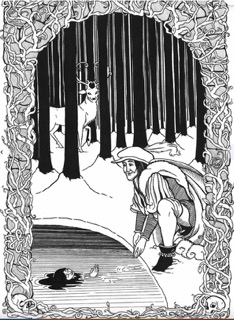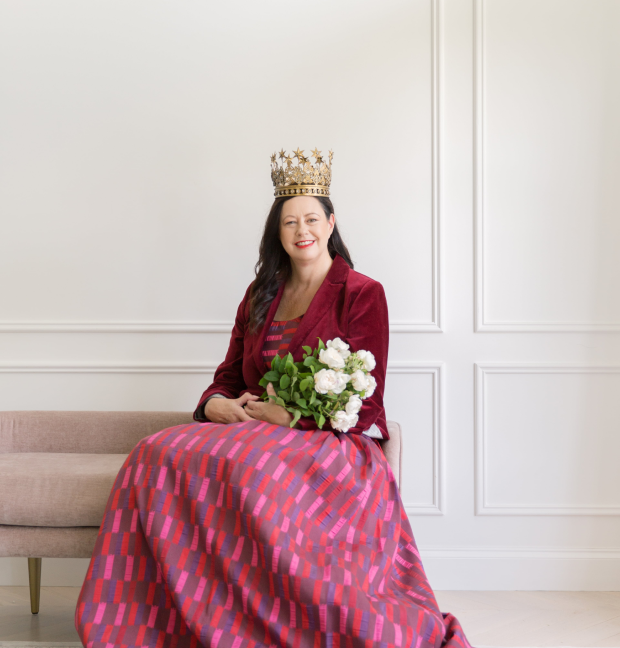
Here is an old German tale about he first Christmas tree, retold by me:
A long time ago, in a small kingdom in Germany, there lived a young and handsome count, named Stoneheart by his people because he never fell in love, not once, no matter how pretty the girls brought to his notice.
One snowy Christmas Eve, Count Stoneheart and his court rode out to hunt in the great forest that surrounded his castle. They galloped deep into the forest, deeper than they had ever ridden before, till they were far from home. A white hart leaped through the forest, and Count Stoneheart whipped up his horse and raced after it, his courtiers streaming behind him. The hart ran so fast and so far that the hunt could not keep up; soon only Count Stoneheart was still in pursuit.
Then the hart leapt through a hedge of thorns and disappeared. Count Stoneheart found himself alone in the forest, with no idea of the way home. For as far as the eye could see, the trees stretched, black against the white. A raven called. Twilight fell.
In the clearing ahead was a pool of green water, somehow free of the ice that hung from every twig and thorn. Count Stoneheart dismounted and knelt by the pool to drink. To his surprise, the water was warm. He dipped both hands in, so he could wash his face, and felt a small, soft hand grasp his, slipping from his finger the ring he always wore.
Amazed, the count sat back on his heels, staring into the pool. He saw a quick glimpse of the most enchantingly beautiful face he had ever seen, surrounded by swirling tendrils of black hair. The woman in the pool smiled at him, then turned and dived, with a flash of small bare feet.
In the distance, Count Stoneheart heard the call of the hunting horns and the baying of the hounds. He sat still, however, staring into the pool, calling to the woman to return.
It was not long before his courtiers found him, sitting in the twilight by a pool that steamed gently in the freezing air. Together they rode back to the castle, all filled with amazement at his story of the mysterious woman in the pool who had taken his ring.
‘You must have found the Fairy Well,’ said the oldest and wisest of his councillors. ‘It has been a long time since I have heard of it.’
‘You must be careful,’ said his old nursemaid. ‘One shouldn’t meddle with the Fair Folk. Nothing good will come of it.’
‘We shall ride to the well in the morning and drain it dry,’ cried the castle constable. ‘How dare those fairies steal your ring!’
‘I didn’t mind,’ the count said, feeling again that soft hand in his.
When Count Stoneheart retired to bed that night, he could not sleep. He lay twisting and turning till midnight, when suddenly he heard the sound of the most beautiful music. He leapt up from his bed and, drawing his velvet cloak about him, ran down the stairs. A great hammering on the front doors resounded through the castle.
Count Stoneheart flung open the doors and saw before him a crowd of the strangest and most beautiful creatures he had ever seen. Some were tall and dressed in leaves, with flowers twined in their hair. Others were short and hairy, with squashed noses and eyes like slits. Some fluttered about in the air like huge butterflies, while others slithered in, their scaly bodies undulating like snakes. Leaping musicians played pipes and drums, and Count Stoneheart found himself standing in the midst of a wild and joyous dance, as his unexpected visitors twirled and whirled in through the door.
The fairy folk carried in a tall fir tree and set it in the centre of the hall, and then, holding hands, they danced about it. The tree was hung with glittering icicles and frost flowers that shone like stars in the candlelight. Count Stoneheart stood speechless, gazing at all this beauty and wonder.
Then the most beautiful woman Count Stoneheart had ever seen danced towards him, laughing. Dressed in a flowing mantle of green, she wore a crown of holly berries on her flowing, raven-black hair. ‘I am Elfrieda, the Queen of the Fairies,’ she said. ‘I have come to return your midwinter visit, and to give back to you what was lost in the Fairy Well.’
She held out her hand and there in her palm was the lost ring. Count Stoneheart took back his ring and bent his head to kiss her soft palm, and she smiled and drew him into the dance.
All night the count and the fairy queen danced about that mysterious glittering tree, the haunting music keeping all weariness from him. At last, at dawn, the singing and dancing stopped, and the fairy folk turned to flee. But Count Stoneheart seized Elfrieda’s hand and would not let her go.
‘Please stay with me,’ he begged. ‘I have fallen in love with you. Stay and be my bride.’
‘I will stay with you,’ Queen Elfrieda replied, holding both his hands in her own. ‘For I too have fallen in love with you. However, you must make me a faithful promise. You must never say the word “death” in my presence. Can you swear that for me?’
‘Of course,’ the Count replied, filled with joy.
They were married the very next day.
A year passed happily, and the Queen gave birth to a beautiful baby boy. Winter once again mantled the land with snow, and Count Stoneheart decided to go hunting in the forest on Christmas Eve, as he had done the previous year.
The horses were saddled and bridled and brought to the gate, but his wife was not ready. Count Stoneheart waited impatiently, the horses stamping their hooves and blowing white steam through their nostrils. Still the Queen was not ready. The dogs shivered and whined, and the huntsmen rubbed their hands together and blew into them. Still the Queen was not ready.
At last, as the last of the daylight slipped away, the Queen came down, looking very beautiful in her green velvet riding dress and feathered hat.
Count Stoneheart cried, ‘As slow as you are, you’d be a good messenger to send for Death!’
As soon as his wife heard the forbidden word on his lips, she gave a wild cry. A whirlwind caught her up and bore her away. Desperately she caught at the stone archway above the castle gate, trying to stay, but the wind was too strong. She disappeared into the dusk, only the sound of her scream lingering in the air.
Although Count Stoneheart searched all through the forest and all through the land, he never saw her again. All that was left of her was the imprint of her small hand in the stone archway.
Every Christmas Eve till he died, Count Stoneheart set up a fir tree in his great hall, and decorated it with sparkling jewels and lighted candles, to try and recapture the magic of the fairy tree. He would sit beside it with his son and tell him the story of how he had first met his mother, and how he had lost her through his pride and impatience. When his son grew up, he too celebrated Christmas with a fir tree from the forest, and the practise slowly spread throughout the land, till every house had its tree hung with shimmering lights each Christmas Eve.
Count Stoneheart’s castle lies in ruins now, though the archway still stands, with the shape of a small, desperate hand still imprinted upon it.
The story was originally published around 1866 as ‘The Christmas Fairy Of Strasburg’ by J. Stirling Coyne, said to be adapted from an old German folktale. My retelling of the story was first published in ‘Gramayre’ (Issue 2, Winter 2012), but as since been republished in Once Upon A Christmas, edited by Beattie Alvarez, First Christmas Press (2014) and translated into German and published in Hinter Dornenhecken und Zauberspiegeln, Drachenmond Verlag, (2016).

